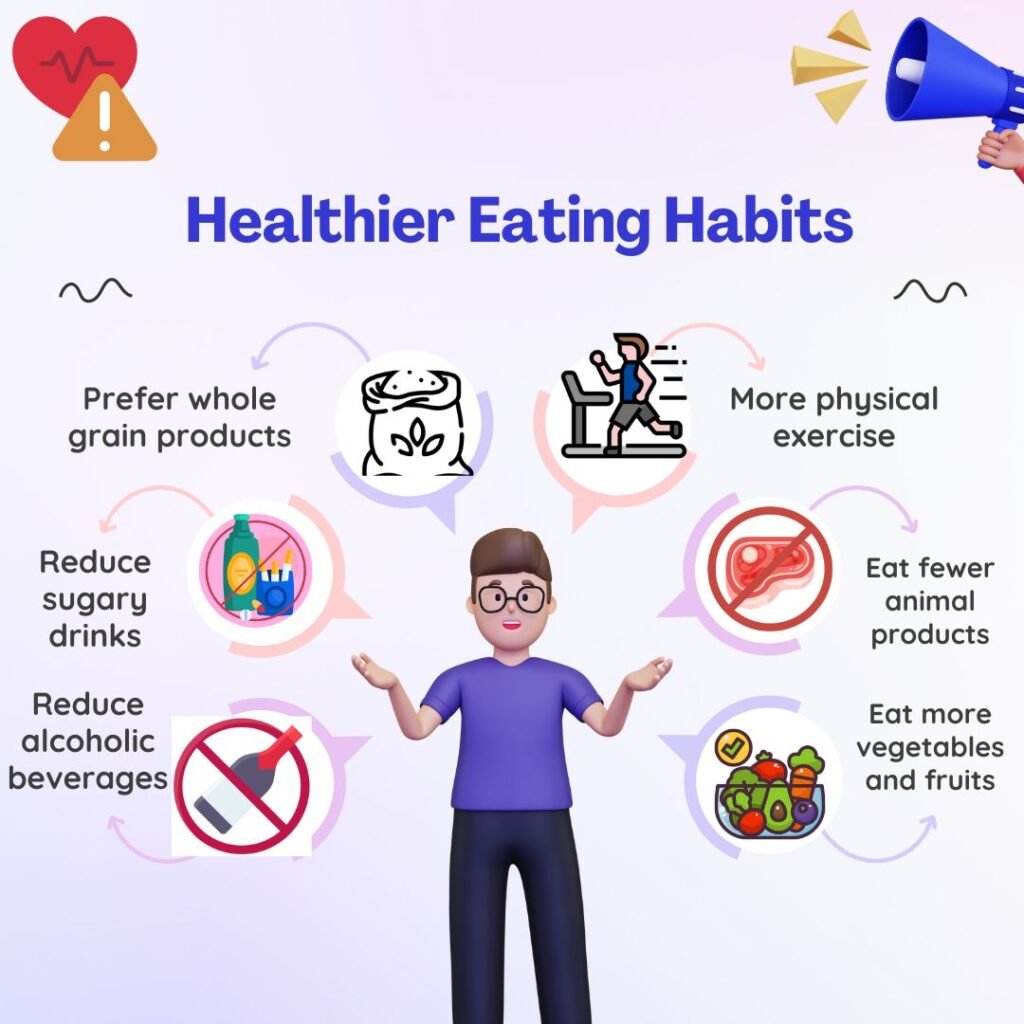Introduction
In a world inundated with fad diets, quick fixes, and conflicting advice, the pursuit of weight loss can feel like navigating a maze without a map. The quest for a healthier, more vibrant life often begins with the question, “How to lose weight?” Yet the answer is far from straightforward. While crash diets and extreme exercise regimens may promise rapid results, they often lead to unsustainable outcomes and potential health risks. Instead, achieving lasting weight loss requires a holistic approach that prioritizes balance, moderation, and long-term habits. In this article, we’ll delve into evidence-based strategies, practical tips, and mindset shifts necessary for embarking on a journey towards sustainable and healthy weight loss. Whether you’re just starting out or looking to revamp your approach, this guide aims to empower you with the knowledge and tools needed to achieve your goals while nurturing a positive relationship with food and your body.
How to lose weight: 10 Helpful Tips

Everywhere you turn, be it magazines, bestseller lists, or health websites, you’re inundated with promises of revolutionary diets promising quick weight loss. While some may yield temporary success, the pounds inevitably return, trapping you in the frustrating cycle known as the yo-yo effect on the quest for the perfect figure.
The reality is that there’s no one-size-fits-all solution when it comes to diets. Temporary changes rarely lead to lasting results. Instead, the key lies in embracing patience and persistence. Often, making small adjustments to your eating habits can suffice, but they must be maintained over time through a structured meal plan. Achieving a simpler, healthier life isn’t as complicated as it seems. Ten simple guidelines offer the path forward.
Here are the top recommendations for healthier eating habits:
- Steer clear of sweets.
- Opt for whole-grain options.
- Decrease intake of animal products.
- Increase consumption of vegetables and fruits.
- Cut down on sugary beverages.
- Limit alcoholic drinks.
- Practice slower eating and longer chewing.
- Listen to your body’s signals and stop eating when satisfied.
- Incorporate more physical activity into your routine.
- Avoid crash diets; weight loss is a gradual process.
Take the time to understand your body thoroughly
It’s not uncommon for individuals who have maintained a stable weight to find themselves grappling with sizing issues as they enter their middle years. As we age, our bodies typically require fewer nutrients, and our food intake needs to adjust accordingly. Continuing to consume the same portions as before can lead to inevitable weight gain. Additionally, lifestyle changes and certain medical conditions can also contribute to fluctuations in weight by impacting metabolism.
Balance of Hormones
An ongoing deficiency in thyroid hormones (for instance, due to untreated hypothyroidism) can result in a notable increase in body weight. The declining levels of female hormones experienced during menopause often manifest in observable weight changes. Similar effects can be observed in men as they age, although these processes tend to be more gradual for them.
Blood Parameters
Excess weight can have enduring impacts on blood test outcomes. Levels of blood sugar, cholesterol, or uric acid frequently register as elevated. These may indicate early conditions that obesity or an unhealthy diet can trigger, such as type 2 diabetes and coronary heart disease.
Metabolism
Individuals vary in the amount of energy required for daily functions. The basal metabolic rate, which represents the energy needed to sustain vital functions, also fluctuates significantly from person to person.Individual characteristics influence metabolism. Those who lead active lifestyles and rarely rest are less likely to struggle with weight issues. Conversely, individuals with a more sedentary disposition are at a higher risk of weight gain.
Read also: E. COLI: UNRAVELING THE MICROBIAL MYSTERIES IN MODERN TIMES
How to lose weight: A Lasting Transformation

Achieving a permanent change in one’s diet requires aligning calorie intake with individual living conditions and bodily needs. Establishing a stable equilibrium between food consumption and requirements necessitates careful consideration. The objective is to devise a dietary regimen that can be sustained over the long haul. Abrupt fasting protocols often prove counterproductive as the body, perceiving a shortage, adjusts by utilizing available nutrients more sparingly. Rapid weight gain typically leads to increased food consumption, highlighting that calorie quantity isn’t the sole determinant. Poor or imbalanced nutrition can also contribute to obesity.
Dietary Patterns
Frequently, we overindulge and eat hastily, often opting for the wrong foods. Many individuals have lost touch with their innate understanding of nutritional needs and what’s truly beneficial. In our fast-paced lives, meals are often consumed according to the clock rather than genuine hunger signals, often resulting in oversized portions before true satiety sets in. Moreover, fast food and snacks are often laden with excessive sugar and fat, offering a tantalizing taste but in modest servings.
Impact of Stress
Stress exacerbates hurried eating habits, leaving little time for the mindful consumption of nutritious meals. Instead, people resort to readily available snacks lacking in healthful qualities. Furthermore, stress serves as an emotional trigger, prompting the consumption of comforting foods in response to frustration. Over time, this reliance on eating for solace can lead to eating disorders requiring comprehensive intervention.
Lack of Physical Activity
In an increasingly sedentary lifestyle, characterized by prolonged periods of sitting, physical activity is often neglected. Many individuals confine themselves to office desks during their workdays and then spend their leisure time on the sofa. This lack of balance contributes to a diminished sense of self-awareness and body consciousness. Incorporating movement into daily routines not only alters self-perception but also positively influences dietary habits.
While exercise does burn calories, it’s insufficient to offset excessive food intake solely through physical activity. This feat is achievable only by elite athletes engaged in extreme endurance sports.
Can I lose weight without exercise?
Losing weight without exercise is indeed possible, though it typically requires a meticulous approach to diet and lifestyle. By focusing on a balanced, nutrient-rich diet, managing portion sizes, and incorporating healthy habits like staying hydrated and getting adequate sleep, individuals can create a caloric deficit conducive to weight loss. Embracing mindful eating practices, such as paying attention to hunger cues and avoiding emotional eating, can further enhance results. While exercise undoubtedly offers numerous health benefits, weight loss can still be achieved through dietary adjustments and lifestyle modifications alone. However, combining both healthy eating habits and regular physical activity often yields the most sustainable and comprehensive approach to achieving and maintaining weight loss goals.
How to lose weight without exercise: Should I follow a diet?

Diets offer the promise of successful weight loss through temporary alterations in eating habits. However, these triumphs often prove fleeting. It’s likely that sustained weight management requires a permanent shift in dietary patterns. Establishing a consistent eating plan or adopting lifelong nutritional habits provides a dependable roadmap for achieving this goal.
How to lose weight: What options exist for diets?
- The Atkins diet severely restricts carbohydrates while allowing an unrestricted intake of fat and protein. Potential side effects include halitosis, headaches, constipation, and fatigue. The unbalanced nature of this diet may lead to excessive salt consumption and an insufficient intake of vitamins and fiber.
- The HCG diet combines hormone injections with a drastic calorie reduction to 500 kilocalories per day. Concerns about health damage stemming from inadequate nutrition and regular doses of the pregnancy hormone HCG accompany this diet, which lacks approval for weight reduction.
- Intermittent fasting involves eating within an 8-hour window and fasting for the remaining 16 hours. Although touted for its gentle approach and health benefits, recent research suggests it has only a modest impact on weight loss.
- Shake diets involve replacing meals with pre-made diet drinks. While potentially safe if they contain all necessary nutrients, transitioning back to solid food post-diet can pose challenges.
- Low-carb diets focus on reducing carbohydrate intake while still permitting consumption of vegetables, meat, fruit, and dairy. However, some low-carb recipes may be excessively meat-centric, potentially leading to long-term health issues.
- Nutritionists are increasingly questioning the classic approach of the low-fat diet. Fat’s reputation as the primary cause of weight gain is being reevaluated in light of current understanding.
Achieving Weight Loss and Embracing Healthy Eating
By adopting a nutritious diet, shedding extra pounds becomes achievable while also sustaining your ideal weight over the long term. Making drastic lifestyle changes isn’t typically required, but it’s crucial to stick to a well-defined nutrition plan consistently.
Tips for Weight Loss
Incorporating certain foods into your diet can facilitate weight loss effectively.
Many items commonly consumed already contribute significantly to a wholesome eating regimen. Nonetheless, it’s important to maintain the pleasure and satisfaction of eating within the chosen dietary framework. While this approach might not yield rapid weight loss, it enables the sustainable shedding of excess pounds in the long run. Pro tip: Incorporating spices like cinnamon can help alleviate initial hunger pangs. Recommended foods for effective weight loss include the following:
- Whole-grain products
- Vegetables
- Fish
- Nuts
- Low-fat natural yogurt
- Low-fat quark
- Oatmeal
- Chia seeds
- Lettuce and tomato
- Cinnamon
It’s essential to cut out these items from your diet
Recipes packed with excessive sugar pose a significant obstacle for anyone aiming to shed pounds. The issue lies in the fact that certain foods harbor high sugar content without it being immediately apparent. Moreover, sugar hides behind a myriad of names on packaging ingredient lists: glucose, fructose, malt extract, lactose, sucrose, and maltodextrin, to name a few. The interplay between fat and sugar is equally crucial. Even individuals within a healthy weight range should exercise restraint when consuming these foods. Furthermore, diets abundant in carbohydrates, such as numerous baked goods, pasta, and white rice, can lead to long-term weight gain. It’s advisable to steer clear of the following items:
- Ice cream
- Chips and crisps
- Fruit yogurts with excessive sweetness
- Indulgent cream cakes
- Condiments like ketchup, mayonnaise, mustard, and barbecue sauces
- Dried fruits
- Processed sausages
- Refined vegetable oils
Eliminating these foods from your diet is imperative for maintaining a healthier lifestyle and achieving weight-loss goals.
Connection Between Weight Loss and Your Daily Beverage Choices
While many individuals concentrate on their food intake when embarking on a weight loss journey, the beverages they consume also play a significant role. Lemonade, iced tea, and other soft drinks often pack a hefty calorie punch due to their high sugar content, acting as a potent contributor to weight gain.
How to lose weight through Beverage Choices
To expedite weight loss, it’s crucial to increase fluid intake, but opting for sugar-laden beverages should be avoided altogether. Vegetable smoothies offer a nutritious alternative, are rich in fiber, and are capable of replacing entire meals. Consider incorporating appetite-suppressing or health-promoting teas like mate tea, ginger tea, and green tea into your routine. Opt for the following drinks to aid in weight loss:
- Water
- Unsweetened herbal tea
- Unsweetened fruit tea
- Green tea
- Ginger tea
- Mate tea
- Low-fat milk
- Buttermilk
- Vegetable smoothies
- Vegetable juice (such as tomato or carrot)
Steer Clear of These Beverages
Beverages to Steer Clear Of Lemonades, colas, and other soft drinks can be laden with excessive sugar, hindering weight loss efforts. Instead, opt for sugar-free alternatives. Light and diet drinks may seem like viable options, but their sugar substitutes can actually stimulate appetite, making weight loss unnecessarily challenging. For optimal results, stick to water with meals and avoid the following beverages:
- Sugary soft drinks
- Fruit juices
- Heavily sweetened iced teas
- Ready-made fruit smoothies
- Alcoholic beverages
- Light drinks
- Energy drinks
How to lose weight with green smoothies
Green smoothies are most effective when packed with leafy vegetables and minimal fruit. By limiting the fruit content, fructose levels remain low, and calorie counts correspondingly decrease. Fresh ingredients provide essential nutrients and can serve as a complete meal replacement, bolstering weight-loss efforts. The weight-reducing effect of green smoothies lies in their ability to supplement diets lacking in vitamins and minerals.
How To Lose Weight Through Sports and Physical Activity

These exercises are calorie-burners
Engaging in endurance sports can complement a permanent dietary change for weight loss. If you’re new to exercise, it’s advisable to start slowly. Initially, your muscles and joints may struggle with intense exertion. Therefore, it’s important not to ramp up physical demands too quickly but rather to increase them gradually. Once you’ve built up some fitness, physical activity can enhance your well-being and motivation for weight loss. It’s recommended to exercise several times per week. The following sports are particularly effective for burning calories and accelerating weight loss:
- Cycling
- Walking
- Swimming
- Running
- Boxing workouts
- Step aerobics
- Interval training
Does pilates help you lose weight?
Pilates can be a valuable component of a weight loss journey, but its primary focus is on building strength, flexibility, and improving posture rather than solely shedding pounds. While Pilates can contribute to calorie burning, especially in more intense sessions, its effectiveness for weight loss may vary depending on individual factors such as frequency of practice, intensity level, and dietary habits. Pilates exercises engage multiple muscle groups, leading to improved muscle tone and increased metabolism over time, which can support weight-loss efforts when combined with a balanced diet and an overall active lifestyle. However, for significant weight loss, it’s crucial to incorporate Pilates into a comprehensive fitness routine that includes cardiovascular exercise and strength training, along with mindful eating habits.
Does yoga help you lose weight?
Yoga offers a holistic approach to weight loss by combining physical activity with mindfulness and stress reduction techniques. While traditional yoga practices may not result in rapid weight loss like high-intensity cardio workouts, they can still be effective in promoting overall wellness and supporting sustainable weight management. Yoga’s emphasis on breath control, flexibility, and strength-building exercises can enhance metabolism, improve muscle tone, and increase calorie burning. Additionally, yoga’s focus on mindfulness can help cultivate a healthier relationship with food, leading to more mindful eating habits and better self-awareness around hunger and satiety cues. While yoga alone may not be sufficient for significant weight loss, it can be a valuable component of a balanced fitness routine and a healthy lifestyle.
How To Lose Weight: If Stomach Surgery Becomes Essential
If stomach surgery becomes necessary due to extreme obesity, typically categorized as grade III, and other methods of weight control have proven ineffective, a doctor might recommend surgical intervention to reduce the size of the stomach. In cases where additional health issues are present, even those classified as grade II obesity may benefit from partial stomach removal. This surgical approach limits food intake by reducing stomach capacity, leading to earlier feelings of fullness and facilitating weight loss. Following the procedure, patients may experience a substantial weight reduction of 30 to 50 kilograms over a span of two years. However, like any surgical procedure, there are associated risks of complications. Patients require ongoing supportive care to prevent potential deficiencies, particularly in essential vitamins, or other health issues arising from rapid weight loss.
What are the surgical options?
Surgeons most often perform three types of operations
- gastric sleeve
- gastric bypass
- adjustable gastric band
Summary
The article discusses safe and effective methods for losing weight amidst a sea of fad diets and conflicting advice. It emphasizes the importance of a holistic approach to weight loss that prioritizes balance, moderation, and long-term habits over crash diets and extreme exercise regimens. The article provides evidence-based strategies, practical tips, and mindset shifts necessary for sustainable and healthy weight loss.
Key points covered include:
- Top 10 Recommendations for Healthier Eating Habits
- Understanding the Body
- Lasting Transformation
- Types of Diets
- Incorporating Healthy Foods
- Avoiding Unhealthy Foods
- Beverage Choices
- Exercise for Weight Loss
- Pilates and Yoga
- Stomach Surgery
Overall, the article emphasizes the importance of adopting sustainable lifestyle changes and seeking professional guidance when necessary for safe and effective weight loss.
